6 Things To Consider When Buying A House In Japan

This article will introduce things you should know before buying a house in Japan. Some of the topics covered are understanding Japanese floor plans, the steps for purchasing property, home mortgages, real estate tax, and housing prices in Tokyo.
Buying a House in Japan
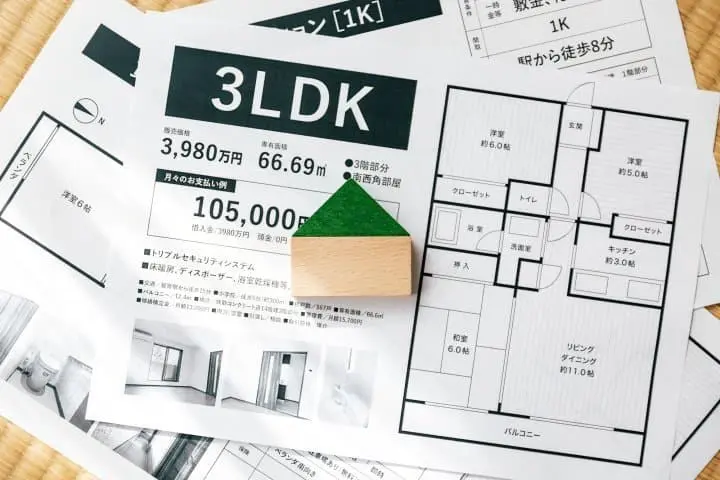
Picture courtesy of PIXTA
If you plan to buy a house in Japan, you should consider a few things before your purchase.
Read on to learn about Japanese floor plans, fees, and the application procedure to obtain the house of your dreams!
Table of Contents
1. Understanding the Abbreviations Used in Floor Plans
2. Learning the Steps in the Home Buying Process
3. Can Foreign Residents Apply for a Housing Mortgage?
4. Can Non-Residents Buy a Property in Japan? What You Need to Know
5. What Are the Property Taxes and Fees?
6. What Are the Housing Prices in Tokyo?
Minami Aoyama Real Estate: A Top Choice for Foreigners Looking to Buy a Property in Japan
1. Understanding the Abbreviations Used in Floor Plans
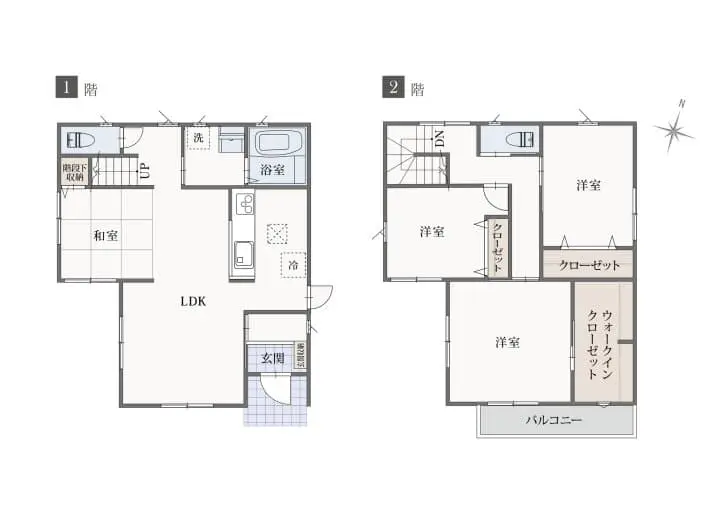
Picture courtesy of PIXTA
First, let's become familiar with the abbreviations used in Japanese floor plans. The layout of a room commonly features the capitalized letters "L, D, and K."
The table below reveals the meaning behind this acronym. This should come in handy whether you're looking to purchase property or rent a room.
| Floor Plan Abbreviations | |
| L | Living Room |
| D | Dining Room |
| K | Kitchen |
| UB | Unit Bath (Bathroom) |
| WC | Water Closet (Restroom) |
| CL | Closet |
| RF | Roof Floor (Loft) |
| SB | Shoe Box (Shoe Closet) |
| MB | Meter Box (Meter for Gas, Electricity, and Water) |
The following is a list of common terms used by real estate agents.
| Common Real Estate Terms | |
| Yoshitsu | Western-style Room |
| Washitsu | Japanese-style room with tatami mats |
| Balcony | Balcony |
| Sen | An abbreviation for laundry room |
| Closet | Closet |
| Walk-in Closet | A large closet that you can walk into. |
| Roka | Corridor |
| Jo | The size of one tatami mat (1 tatami mat=1.6562㎡) |
Keep these terms in mind when looking at Japanese floor plans. Below are some common layout abbreviations you'll encounter when searching for properties.
| Layout Abbreviations | Meaning | Size |
| 1R | One bedroom with a kitchen in the corner. | About 13㎡/Bedroom: 8 to 12㎡ |
| 1K | One bedroom with a partitioned kitchen. | About 13 to 25㎡/Bedroom: 8 to 12㎡ |
| 1DK | One bedroom and a kitchen with a dining area./7 to 13㎡ of kitchen and dining area | About 20 to 30㎡/Bedroom: 7 to 13㎡ |
| 1LDK | One bedroom and a kitchen with a living-dining area./About 13㎡ of kitchen and living-dining area | About 23 to 35㎡/Bedroom: 7 to 13㎡ |
The number of bedrooms always comes first in the layout abbreviations.
For example, "1LDK" means that the floor plan has one bedroom and a kitchen with a living-dining area. "2LDK" indicates two bedrooms and a kitchen with a living-dining area.
Please note that the common area and balcony in Japanese condominiums are not regarded as a private area.
2. Learn the Steps in the Home Buying Process
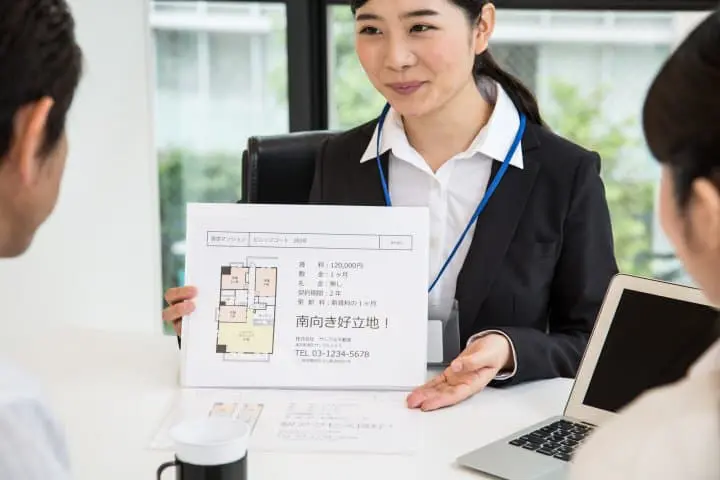
Picture courtesy of PIXTA
The procedure of buying a house starts after a private viewing. The details will differ depending on whether the house is newly built or a resale property.
The table below outlines the procedures of purchasing a new home or a presale condo.
| The Process of Buying a New Home | |
| Step 1: Find a property | Consult with a real estate agency to begin house hunting. |
| Step 2: Make an offer | Submit an application to make an offer on a house that appeals to you. |
| Step 3: Lottery held among prospective buyers | If there are multiple prospective buyers, a lottery will be held. |
| Step 4: Sign a contract | A contract will be signed after the disclosure of essential information from the real estate agent. Normally, a deposit between 5 to 10% of the property will be paid in advance. |
| Step 5: Take out a mortgage | If you plan to take out a mortgage from a bank, an application should be submitted in advance. |
| Step 6: Receive the keys | After paying the commission fee, you will receive the keys to your new home. |
The steps in a resale property are conducted in the same way. However, there will be a transfer of ownership of the land or building as the final step. This step will be explained by the real estate agent.
Reagrding home mortages, foreign nationals can be eligible to take out a loan from a Japanese bank, depending on their visa status.
3. Can Foreign Residents Apply for a Housing Mortgage?
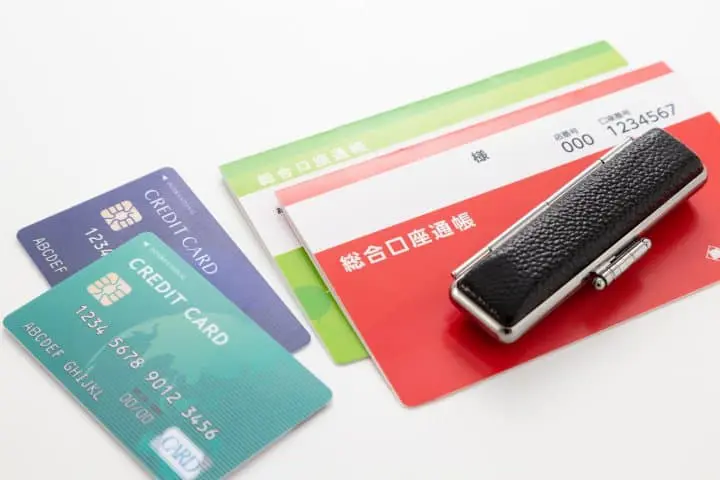
Picture courtesy of PIXTA
You can apply even without permanent residency if you have income or residency history in Japan. However, if you have worked in Japan but are not recognized as a resident (e.g., under SOFA or similar agreements), you will need a formal residence status.
The detailed conditions are as follows:
・Applicants must be 18 years or older at the time of borrowing and not exceed 80 years of age at the time of loan repayment.
・Applicants must be able to enroll in the group credit life insurance specified by the bank.
・Applicants must be residing in Japan, whether they are Japanese nationals or foreign nationals.
・Applicants must have a stable income of at least 5 million yen in the previous year (for self-employed individuals, this refers to declared income).
Source: SMBC Trust Bank
4. Can Non-Residents Buy a Property in Japan? What You Need to Know
In Japan, purchasing a property is possible regardless of your visa status or whether you have a local bank account. However, non-residents typically face challenges when applying for a mortgage, meaning a full cash payment is generally required.Moreover, owning a property in Japan does not automatically grant you a long-term visa, so if you're planning to move to Japan, you'll need to apply for the appropriate visa separately.
Procedures and Key Considerations for Purchasing a Property
The procedure for purchasing real estate in Japan is largely the same as for domestic buyers, and it is relatively straightforward for foreigners as well.
First, you’ll need to find a property that suits your preferences. Once you’ve found a property you like, you can inform the real estate agency of your intention to purchase. The agency will then negotiate with the seller on your behalf.
Once the sales contract is signed and the deposit is paid, the contract is considered finalized. The remaining balance can be paid via international transfer or in cash, and having a Japanese bank account is not necessary. After full payment is made, the transfer of ownership is completed, and the property is handed over.
5. What Are the Property Taxes and Fees?
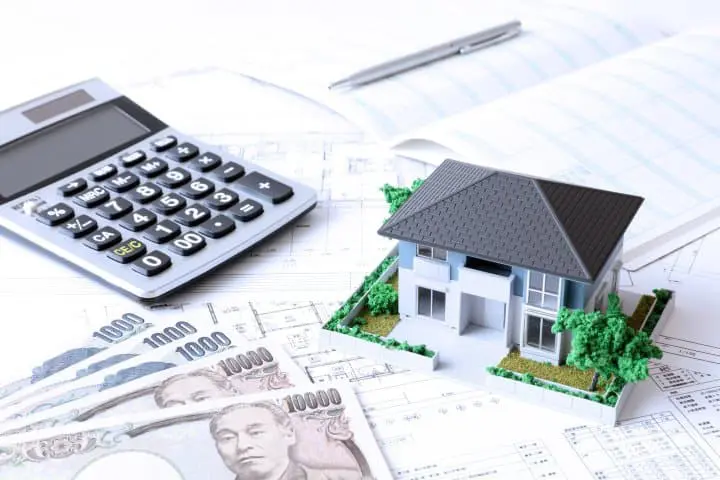
Picture courtesy of PIXTA
There are taxes to be paid in Japan when buying a house, including payments after the housing contract is closed.
The following taxes may be imposed upon new homeowners at the time of purchase.
| Real-Estate Related Taxes | |
| Stamp Tax | 10,000 yen for houses ranging from 5 to 10 million yen./20,000 yen for houses ranging from 10 to 50 million yen. |
| Real-Estate Acquisition Tax | 3 to 4% of the market price* |
| Registration and License Taxes | 0.15 to 0.4% of the market price |
| Brokerage Fee | 3 to 5% of the market price plus a maximum of 60,000 yen and consumption tax |
| Taxes to Be Paid After the Purchase | |
| Fixed Property Tax | 1.4% of the appraisal value |
| City Planning Tax | A maximum of 0.3% of the appraisal value |
The taxes mentioned above will be levied according to the appraisal value set by the local government and property tax bill.
6. What Are the Housing Prices in Tokyo?
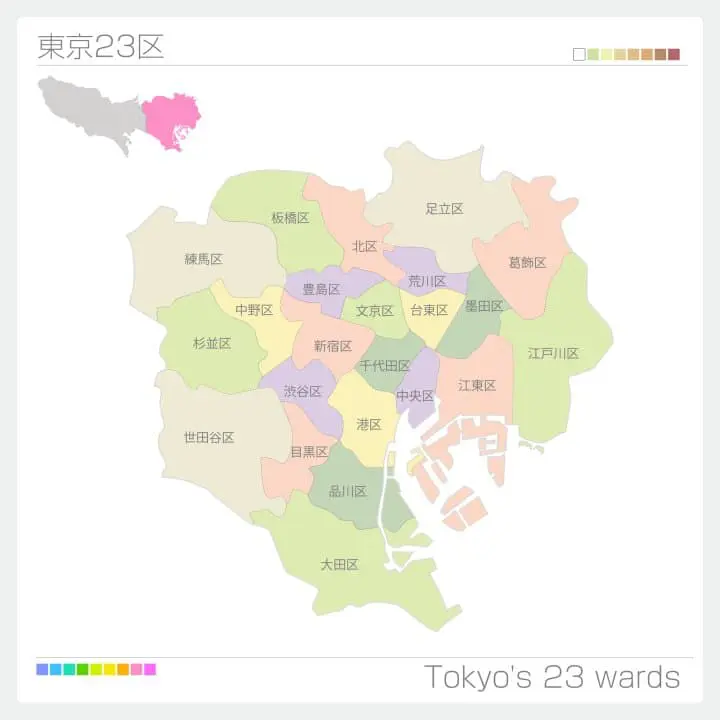
Picture courtesy of PIXTA
So far, we've covered information on how to purchase a home in Japan. However, many people may be more interested in learning about the housing prices here.
The average Japanese family typically consists of two parents and one or two children. Therefore, 3LDK or 4LDK floor plans tend to be popular.
The list below is a price ranking of 3 to 4LDK type houses measuring about 80 square meters that were constructed ten years ago. It does not include the land value.
| Ranking | Special Wards of Tokyo | Price |
| 1 | Shibuya Ward | 110 to 130 million yen |
| 2 | Meguro Ward | 96 to 120 million yen |
| 3 | Chiyoda Ward | 92 to 110 million yen |
| 4 | Minato Ward | 84 to 100 million yen |
| 5 | Nakano Ward | 83 to 100 million yen |
| 6 | Shinagawa Ward | 78 to 95 million yen |
| 7 | Setagaya Ward | 76 to 93 million yen |
| 8 | Chuo Ward | 76 to 93 million yen |
| 9 | Shinjuku Ward | 75 to 91 million yen |
| 10 | Suginami Ward | 73 to 90 million yen |
Excerpt from HowMa Magazine (Japanese Link)
Real estate prices in Japan are influenced by various factors, such as location and the nearby transportation lines. In central areas like Minato and Shibuya wards, which are home to many luxury residential areas and commercial districts, property prices are very high, with properties over 100 million yen not being uncommon. In particular, areas like Azabu in Minato and Shoto in Shibuya are known for high-end apartments and houses aimed at wealthy buyers, making them markets for those with a larger budget.
Additionally, popular areas such as Setagaya and Meguro remain in the higher price range. These areas are favored by families due to their peaceful residential neighborhoods and excellent access to central Tokyo, offering a well-balanced living environment.
Given the significant price differences across different areas in Tokyo’s real estate market, it’s essential to choose a location that suits your lifestyle and budget.
Minami Aoyama Real Estate: A Top Choice for Foreigners Looking to Buy a Property in Japan
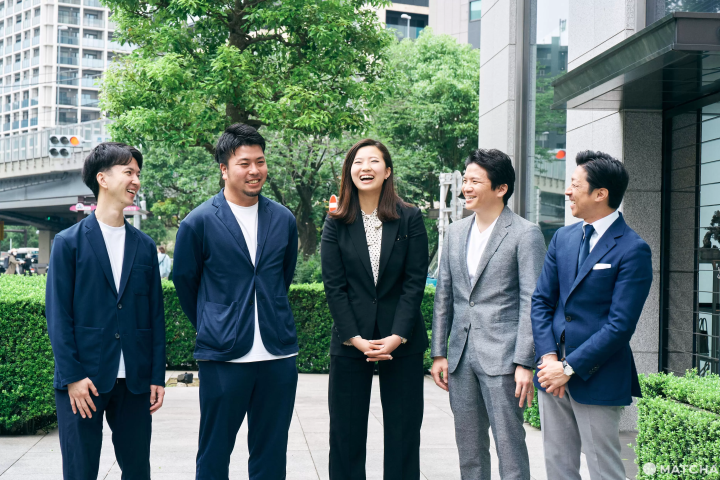
Minami Aoyama Real Estate is a real estate company in Japan specializing in services for foreigners. They provide the following support to help foreigners purchase and manage their properties in Japan with peace of mind, utilizing their expertise and track record:
・Multilingual support (English, Chinese)
・Advice on contracts, legal matters, and taxation
・Investment property recommendations and market analysis
・Post-purchase management and rental support
They are not just a partner for property searching but a strong supporter that is well-acquainted with the Japanese real estate market, assisting throughout the entire process from purchase to operation. If you’re a first-time buyer in Japan, contact Minami Aoyama Real Estate.
Don't Rush When Purchasing a Home
Many foreign residents dream of becoming a homeowners in Japan. It would help if you took the time to examine all of the housing options while considering important factors such as income, visa status, and mortgage.
Read also
Main image courtesy of PIXTA
I am currently working as the Taiwan version editor for MATCHA. I am from Changhua County and during my time in Taiwan, I worked as a domestic Japanese tour guide and in interview PR for a Japanese television station. I am skilled at arranging travel itineraries, particularly for food and hot spring-related attractions. My interests include photography, especially food and portrait photography. Due to my age and my fondness for places like bars and izakayas, I call myself 'Matcha Uncle'.





































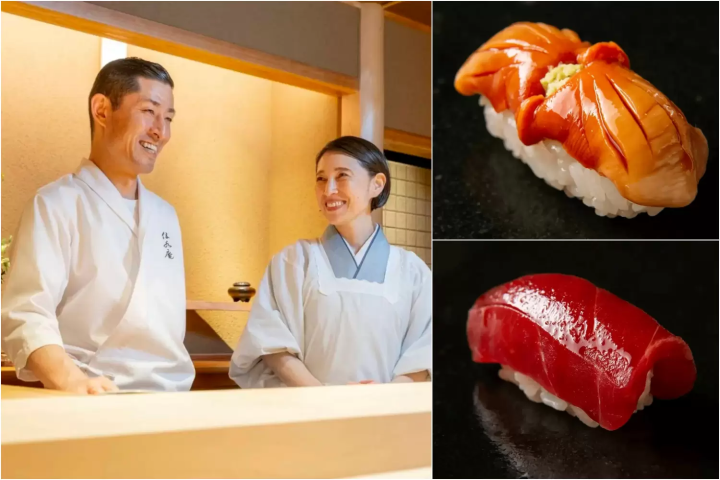
![[No need to worry!] A guide to buying entertainment tickets in Japan](https://resources.matcha-jp.com/resize/720x2000/2025/04/21-231654.webp)
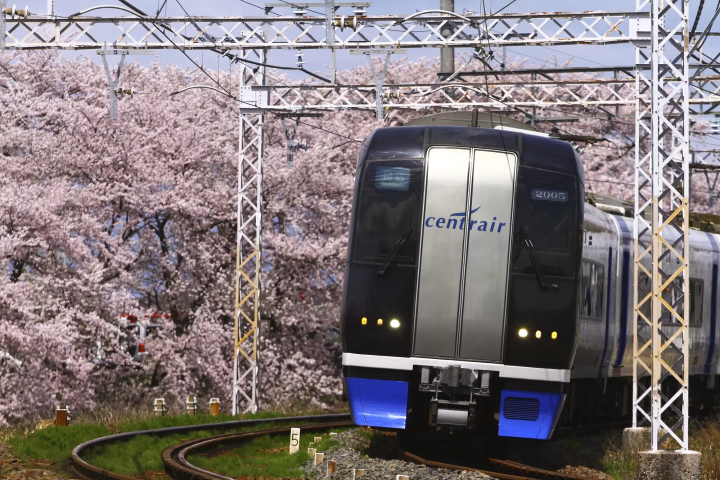

![[ Naruto City, Tokushima Prefecture ] Experience the world's largest whirlpools up close on a sightseeing boat at the Spring Whirlpool Festival!](https://resources.matcha-jp.com/resize/720x2000/2025/02/05-222727.webp)